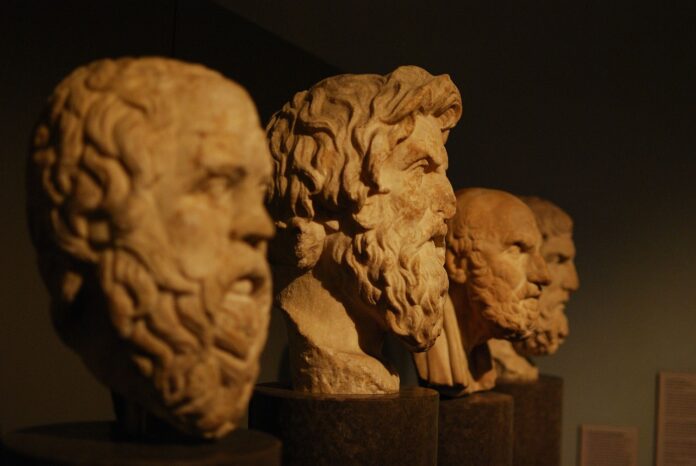
Who Were These Ancient Thinkers?
Ancient philosophers like Socrates, Plato, and Aristotle developed ideas that still help us understand life, decision-making, and personal growth to this day. Socrates taught us self-testing and critical questioning so that we may think deeply about what we truly believe in and value, prior to making a decision. Plato encouraged us with his Theory of Forms to pursue higher ideals of justice, truth, and beauty, and not be satisfied with the unsubstantial pleasures of this world. Aristotle stated that, within the limits of virtue ethics, cultivating qualities like courage, intelligence, and caution is the path to happiness rather than achieving success on the outside. Together, these philosophers established the foundation for a well-considered, meaningful existence while also serving as a reminder that self-awareness, moral clarity, and a commitment to the greater good. These ideas remain just as relevant today, offering timeless guidance in navigating the complexities that come with modern life.
Socrates and the Power of Questions: “Know Thyself”
Socrates’ method of questioning—often referred to as the Socratic Method is a technique of asking deep, probing questions to encourage critical thinking, challenge assumptions, and foster self-reflection. The philosopher Socrates used this approach to help people clarify concepts, explore the consequences of their beliefs, and examine the logical consistency of their reasoning. Instead of providing answers, he guided individuals toward discovering insights on their own, often by questioning definitions, challenging assumptions, and revealing contradictions. This method is centered on dialogue, with the belief that truth emerges through collaborative exploration. In modern context, it is used in fields like education, law, and therapy to help individuals think critically, reframe perspectives, and solve problems by promoting a deeper understanding of complex issues. Ultimately, the Socratic Method encourages ongoing reflection and growth, urging individuals to rethink their beliefs and see situations from new angles.
Plato’s “Allegory of the Cave”: Seeing the World In A New Way
Plato’s book, Allegory of the Cave, is about breaking free from limited perspectives. Imagine being stuck in a dark cave, only able to see shadows on the wall. These shadows are all you’ve ever known, so you think they’re the full reality. In the allegory, someone escapes the cave and discovers the world outside—bright, vast, and full of truth. This represents how many people live, only seeing a narrow, “filtered” view of life, much like how social media can distort reality by showing only highlights or selective parts of life. To find true wisdom, we need to step out of our comfort zones and explore the world beyond these shadows, embracing a fuller, more complex view of life.
Aristotle and the Pursuit of Happiness: Finding Balance
Bibliography:
https://www.britannica.com/biography/Socrateshttps://
www.betterhelp.com/advice/happiness/aristotle-and-plato-how-their-views-on-happiness-can-help-us-today/
https://daily-philosophy.com/platos-theory-of-forms/
https://www.perlego.com/knowledge/study-guides/what-is-aristotles-virtue-ethics/
https://www.britannica.com/topic/Socratic-methodhttps://interestingliterature.com/2023/03/plato-allegory-of-the-cave-summary-analysis/
https://www.britannica.com/topic/eudaimonia
